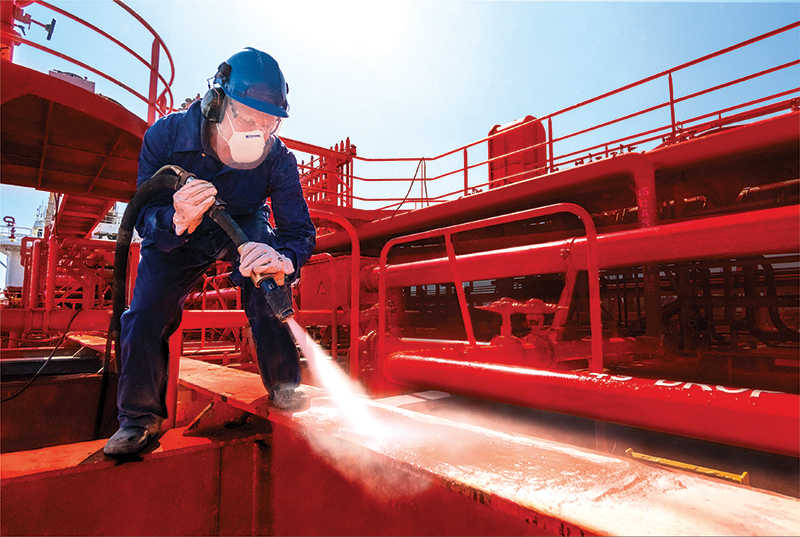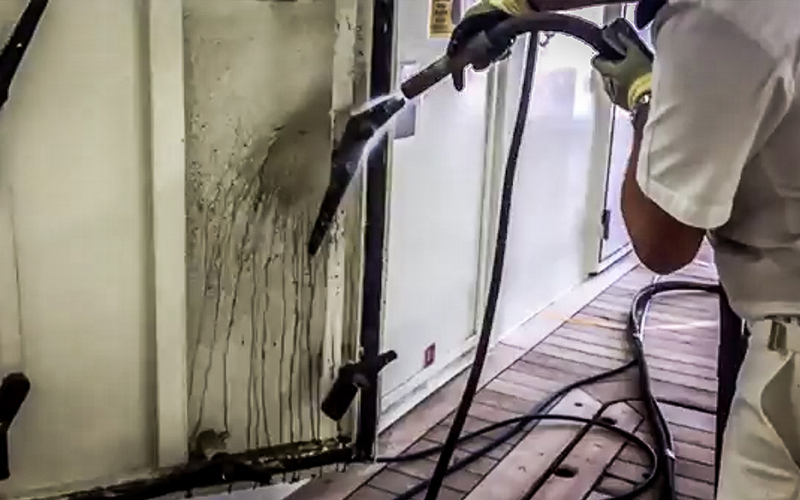Ecoquip case Studies
Why replacing ultra-high pressure water cleaning on oil tankers?
1
A shipowner with a fleet of 30 oil tankers sailing the world’s oceans decided to look for an alternative to ultra-high pressure water jetting to clean the surfaces of its vessels. The main reasons for this decision were linked to the significant health and safety concerns associated with this technique. The very high pressures used can lead to serious injuries with life and limb threatening potential as the combination of irritant material and ultra-high pressure results in an extremely intensive inflammatory reaction. Extra-tough protective clothing is therefore necessary when working with this technique.
The shipowner approached Graco’s distributor in Dubai who immediately recommended the Graco EcoQuip vapour abrasive blasting equipment. Vapour abrasive blasting involves adding water simultaneously with the abrasive media in a pressure pot. The abrasive becomes suspended in water, and the mixture is then projected at high velocity by a forceful flow of compressed air. By encapsulating each blast particle with water, extra weight is added to the media which enlarges the impact of the blast media on the substrate. In addition, the removal and feathering of the material goes smoother and less media is used. The water reduces splash back and traps the dust being produced. A major advantage of vapour abrasive blasting is that it uses less water than ultra-high pressure water jetting or even traditional water-based wet blasting, while reducing dust compared to dry blasting.
The Graco distributor arranged a demonstration of the portable EcoQuip 2 EQp with a 1" hose and standard nozzle, using Olivine GL70 abrasive, which is a very fine naturally occurring magnesium iron silicate. A range of painted valves, rusty pipes, and a section of the deck was blasted.
EcoQuip 2 rose to the occasion and performed superbly. The shipowner was impressed by the fact that it used up to 75% less blast media and far less water than UHP water jetting. Indeed, the shipowner admitted that UHP water jetting uses 12 times more water than vapour abrasive blasting, which is a major drawback in the Middle East. On top, the runoff of this waste water can also damage environmentally sensitive areas.
Discussions turned to lifecycle cost, and it was soon realized that the higher initial cost of UHP water jetting equipment, combined with higher maintenance costs and the higher running costs of the air compressor, mean that the advantage is significantly with vapour abrasive blasting, even when the cost of abrasive is taken into account. The bottom line is that vapour abrasive blasting with EcoQuip reduces project costs while increasing the speed, efficiency and productivity of blasting. And do not forget that all Graco EcoQuips are ATEX Zone 1 approved.
Finally, it was also pointed out that with EcoQuip, minimum PPE material is required: only masks, ear protectors and gloves. UHP water jetting requires special safety suits which cost a minimum of $3000 per person. Moreover, with EcoQuip, other tasks can be carried out safely outside a perimeter of five meters, whereas with UHP water jetting, other nearby tasks have to cease due to the very high pressures and safety issues.
Taking all these factors into consideration led to the shipowner deciding to purchase an EcoQuip unit to replace its UHP water cleaners.
SURFACE PREPARATION ON CHEMICAL TANKERS

A Graco distributor in the UK was contacted by a shipowner with a fleet of 40 ships transporting chemicals around the world. For various on-board spot repair jobs, the company had been using hand tools and dry blasting, but with low success rates.
It’s no surprise, as both methods suffer from major drawbacks. Using hand tools such as scrapers, chipping hammers, or chisels to remove loose, non-adherent paint, rust or scale is the slowest and usually the least satisfactory method of surface preparation. Wire brushing can actually make the surface worse by polishing rather than cleaning the rusted surface.
Dry abrasive blasting is a commonly used method of surface preparation but has inherent problems. Flying abrasive particles and drifting dust may damage equipment, clog filters and create possible environmental problems. It is also possible to trap contaminants on the surface of the substrate being cleaned.
The UK Graco distributor presented the Graco EcoQuip vapour abrasive blasting equipment. It involves adding water simultaneously with the abrasive media in a pressure pot. The abrasive becomes suspended in water, and the mixture is then projected at high velocity by a forceful flow of compressed air. By encapsulating each blast particle with water, extra weight is added to the media which enlarges the impact of the blast media on the substrate. In addition, the removal and feathering of the material goes smoother and less media is used. The water reduces splash back and traps the dust being produced.
The shipowner was immediately interested but wanted to see EcoQuip in action first. A demonstration was therefore arranged on board one of their ships in Scandinavia. A test was carried out on rusted sections of the deck and on a number of painted valves and similar items. The highly portable EcoQuip 2 EQp was used with a 1" hose and standard nozzle, with Olivine GL70 abrasive, which is a very fine naturally occurring magnesium iron silicate. The machine was operated in its eco-mode.
The deck, valves and other items were blasted perfectly. The customer was most impressed by the excellent results achieved within a short timeframe, the small volume of water needed, the low amount of dust created, and the ease of use and portability of EcoQuip 2 EQp. In fact, when compared to dry abrasive blasting, EcoQuip 2 provides an equivalent performance but with up to 92% less dust, thus minimizing the need for PPE, tenting and containment, and decreasing environmental impact. A final feature of the EcoQuip 2 EQp that swayed the company to order a unit is that EcoQuip is fully ATEX approved for use in dangerous environments.
REMOVING RUST ON CRUISE LINERS

Graco was contacted by a globally operating cruise company that was facing a major headache. Rust was appearing on all the hermetic doors in one of their 4500-passenger cruise liners. The problem was compounded because it was discovered in the middle of the cruise season and it was impossible to dock the ship to conduct the necessary maintenance. A solution therefore had to be found to remove the rust during sailing time without any risk or inconvenience to passengers and crew. The cruise company was also looking for ATEX-approved equipment.
Graco presented its ATEX-approved EcoQuip vapour abrasive blasting equipment, which is Graco’s solution for optimal surface preparation for the marine industry. It involves adding water simultaneously with the abrasive media in a pressure pot. The abrasive becomes suspended in water, and the mixture is then projected at high velocity by a forceful flow of compressed air. By encapsulating each blast particle with water, extra weight is added to the media which enlarges the impact of the blast media on the substrate. In addition, the removal and feathering of the material goes smoother and less media is used. The water reduces splash back and traps the dust being produced.
EcoQuip 2 is Graco’s latest vapour abrasive blasting equipment. It provides a performance equivalent to dry abrasive blasting but with up to 92% less dust, thus minimizing the need for PPE, tenting and containment, and decreasing environmental impact. It uses up to 75% less blast media and far less water than wet blasting, and creates little run-off, thus there is no large slurry mess to clean-up and dispose. It’s effective in rain and high humidity, and efficiently removes coatings without damaging the sub-surface. The bottom line is that EcoQuip 2 reduces project costs while increasing the speed, efficiency and productivity of blasting.
A half-day demonstration of EcoQuip 2 was arranged on board the liner during a brief scheduled stopover in a UK port. One rusting hermetic door was blasted using the portable EcoQuip 2 EQp with a 1" hose and standard nozzle, and using Olivine GL70 magnesium iron silicate abrasive. The machine quickly and efficiently removed the rust using only a small amount of abrasive and water. What’s more, the work was completed with a minimum of dust and noise, and with no inconvenience to passengers or crew.
Given the success of the demonstration, the EcoQuip 2 solution was quickly internally approved by the company’s security committee. A unit was purchased and the job was completed satisfactorily on board while cruising/sailing.
For all your enquiries
VMP Vessel Maintenance Products
DR. ROBERT CLARASTRAAT 11
2070 ZWIJNDRECHT
Belgium View on Google Maps
BE0830396016

 Clean/Renovate
Clean/Renovate Exterior
Exterior Interior
Interior Sanitary
Sanitary Protect
Protect Deck/Hull
Deck/Hull Wood-Teak
Wood-Teak Metals
Metals Propeller
Propeller Stone
Stone Interior
Interior Health
Health BioOrg - Clean air
BioOrg - Clean air Fuel
Fuel Fuel Quality
Fuel Quality Conditioners
Conditioners Tank Cleaning
Tank Cleaning Remove/solve
Remove/solve Tests
Tests Technical
Technical Dive equipment
Dive equipment Electricity
Electricity Tools
Tools Engine
Engine Propeller
Propeller Lubricants
Lubricants Water
Water Pools
Pools Exterior
Exterior Permanon
Permanon  Star*Clean Metal Polish
Star*Clean Metal Polish Wood protection
Wood protection Interior
Interior BioOrg Ecosystem
BioOrg Ecosystem KANBERRA GEL
KANBERRA GEL Sanitary
Sanitary TECH SOLUTIONS
TECH SOLUTIONS Aquathethys
Aquathethys ACCELL® CLEAN
ACCELL® CLEAN FUEL MANAGEMENT
FUEL MANAGEMENT GRACO Marine
GRACO Marine HENCO Solutions
HENCO Solutions Matt Chem Marine
Matt Chem Marine PIPING & HOLDING TANKS
PIPING & HOLDING TANKS LFC Biodigester
LFC Biodigester Small LFC Biodigesters
Small LFC Biodigesters LFC-25
LFC-25  Powerchips Green
Powerchips Green  Powder Powerzyme™
Powder Powerzyme™ LFC Cloud
LFC Cloud WEP Effluent Pump
WEP Effluent Pump Downloads
Downloads Fuel
Fuel Biocides
Biocides Fuel quality
Fuel quality Health
Health Clean
Clean Protect
Protect Renew
Renew Technical
Technical ACCELL® CLEAN
ACCELL® CLEAN